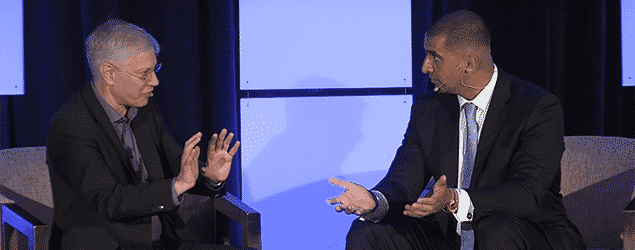A Predictable Outcome to the Presidential Election

As I write this on the morning after the presidential election, one thing is clear: the outcome was predictable.
No, I don’t mean Trump’s victory. Few saw that coming. But what many of us were sure of going into November 8 was that, regardless of who won, the next four years would see our freedom come under increasing attack. For anyone who cares about individual rights and capitalism, these are troubling times.
But the results of this election should not lead those of us who are convinced that Trump will do nothing to further the cause of freedom to give up in despair. We have a unique opportunity ahead of us. I want to explain why.
I spend most of my time on the road, talking to Americans across the country. And the number one thing I hear when I talk about fighting for a culture of reason and freedom is: “Yaron, it’s hopeless. If most people are voting for Trump or for Hillary then there’s no culture left to save.”
I get it. If you look at this presidential race, there was precious little discussion of freedom. On the contrary, both candidates frequently appealed to collectivism and authoritarianism. And their appeals resonated.
Recognizing that we face deep problems in this country, but lacking a rational alternative, Americans of every political persuasion regressed to the “protection” of the group and sought out an authoritarian leader who vowed to fight for their group.
What we really saw in this election was the bankruptcy of the establishment. The false alternative of “left” versus “right” conceals the fact that both sides differ only on the question of who should have the power to shackle and loot whom. Neither side has a positive agenda to offer.
Ayn Rand does. And this is the source of our opportunity.
It is important to keep in mind that these were the most unpopular candidates in recent memory. Many people saw themselves as having to choose between the lesser of two evils. Millions of Americans looked at their choices and thought: these people do not represent me. That should make us pause before giving in to hopelessness. People are fed up with the status quo.
But are they open to a genuine, pro-freedom alternative? Let me tell you a story. Last year ARI senior fellow and chief content officer Onkar Ghate gave a speech on immigration at a large conservative conference. He questioned many of the anti-immigration views advocated by conservatives and discussed how to think about the difficult and controversial issue from an individualist perspective.
The audience’s response was incredibly hostile. He was attacked, interrupted and virtually shouted down. If you’ve ever seen videos of college activists refusing to let their opponents speak, this scene was no different. But after the talk, several members of the audience came up to Onkar, and their reaction was very interesting. They were clearly disturbed by the audience’s behavior, apologized to him and, in a number of cases, said that Onkar’s arguments had made them question their views.
Those were the thinking Americans who give me hope.
In 1961 Ayn Rand gave her first of many talks at Ford Hall Forum. The audience was primarily made up of liberal students who had arrived opposing Rand’s message of individualism and capitalism. So why was she speaking there? In her words: “As an advocate of reason, freedom, individualism and capitalism, I seek to address myself to the men of the intellect — wherever such may still be found.”
The future of a culture is not determined by the majority, but by the intellectually active minority. It is not elections that change a culture, but ideas. At ARI we seek to reach the minority willing to think — to rethink the fundamental ideas that shape a life and a culture. As Onkar’s experience suggests, those people still exist. And in the wreckage of today’s events, we can find an opportunity to reach them.
There is an increasing recognition that the status quo needs to change in a fundamental way. What thinking Americans now want is an explanation of what went wrong and a rational account of what is right.
Ayn Rand’s ideas provide the answers.
Objectivism is the only philosophy that stands for something positive: for reason as an absolute and individualism as a moral ideal. These are the twin ideas required to build a future of science, progress and prosperity — and that are required to defend freedom in opposition to the authoritarian, collectivist trend of today.
But these ideas are radical — they are a complete departure from today’s bankrupt mainstream. That’s why a central component of ARI’s strategy is reaching the young minds willing to question fundamental ideas and challenge conventional wisdom.
My own story may be instructive here. I grew up in Israel and during my teens was an outspoken socialist. I don’t mean a Bernie Sanders, raise-the-top-marginal-tax-rate-a-bit socialist, but a real confiscate-the-means-of-production socialist. Then someone gave me Atlas Shrugged. I read it. I resisted it. I remember throwing it across the room at some point. But I was a thinker, and ultimately, I was persuaded by its irresistible logic.
At ARI we work every day to reach young minds open to reason, and we are seeing mounting signs of success. Let me give you just the most recent example.
On November 4 – 6, ARI organized the largest Ayn Rand student conference to date, attracting 141 students from around the world. The theme — “Live Free and Thrive” — centered on the pivotal issue of free will, and the students heard talks and panels on the Objectivist theory of free will, free will and happiness, building a successful career, and how different views of free will influence important policy debates.
These students were excited about Ayn Rand’s ideas, and they left the conference feeling empowered to fight for their own happiness and for a culture where they will be free to pursue their own happiness. Here are just a few of the responses we got:
It’s completely mind-boggling and really enjoyable and gratifying to meet so many people who are interested in thinking more deeply about the world and Objectivism. Being relatively new to Ayn Rand’s ideas, I was a little concerned that everyone else was going to know much more about Rand, that they were going to look down on me, but that hasn’t been my experience. Everyone is very helpful in guiding you on how to learn more about what you don’t know. — Angelica Werth
In terms of intellectual stimulation and fun, I think that it is a really great and curious group of students. I think there’s a lot of energy and brightness. I think this is one of the conferences where the students were really holistically engaged. — Jennifer Minjarez
It was inspiring, exciting and educational. It’s been an amazing learning experience . . . meeting new people, seeing old faces—just getting to dive deeper into Objectivism, specifically the subject of free will, which is something that resonates with me very closely. — Michelle Tcherniak
We are seeing unprecedented momentum in the Objectivist student movement. That is why I remain optimistic about the future. The conformist thugs on college campuses who recite empty collectivist slogans, shout down their opponents, and hide in “safe spaces” are no match for people who know what they think and why they think it. A bankrupt culture is no match for people fighting for a positive ideal.
At ARI we believe that Objectivism has the power to shape the thought leaders of tomorrow. Our strategy for cultural change is to reach those minds and give them the tools they need to fight for reason, individualism and capitalism. That is why
- we have distributed more than 3.7 million copies of Ayn Rand’s books to high school teachers across the country:
- we run essay contests on Ayn Rand’s novels for students, receiving nearly 400,000 essays since the contests began:
- we created ARI Campus, the leading source for free online courses on Ayn Rand’s novels and ideas, which has already reached tens of thousands of viewers:
- we train tomorrow’s thought leaders at the Objectivist Academic Center, where our graduates have gone on to author papers, publish books and give lectures and courses on Ayn Rand’s ideas:
- we support debate-shaping books on cultural-political issues, including three new volumes from ARI authors in 2016 alone: Equal Is Unfair: America’s Misguided Fight Against Income Inequality, which I co-authored with Don Watkins; Defending Free Speech, edited by Steve Simpson; and Failing to Confront Islamic Totalitarianism, edited by Onkar Ghate and Elan Journo:
- we contribute to and support the publication of scholarly works about Ayn Rand and Objectivism, including the remarkable new volume A Companion to Ayn Rand, edited by Gregory Salmieri and the late Allan Gotthelf—the first book to present scholars with a comprehensive treatment of Rand’s novels and ideas.
There is no question that our battle is difficult. Anyone who tells you that we’re guaranteed to win is wrong. But we can win, and here is the question you have to ask yourself: Do you want to be one of the few who stands against the world and fights for reason, individual happiness and freedom? Or do you want to be someone who gives up without a fight?
If you’re like me, you choose to fight — to fight for your ideas and your values — regardless of the odds. There are many ways to do it. But I believe that one of the best things you can do to support this fight is to support the Ayn Rand Institute.
You can support our critical work — you can be part of the fight — by going online right now to http://www.aynrand.org/donate.
Every dollar of your support matters. Every dollar you give goes toward reaching young minds and promoting tomorrow’s thought leaders in order to realize the vision of Ayn Rand’s novels.
I hope you will join me.



